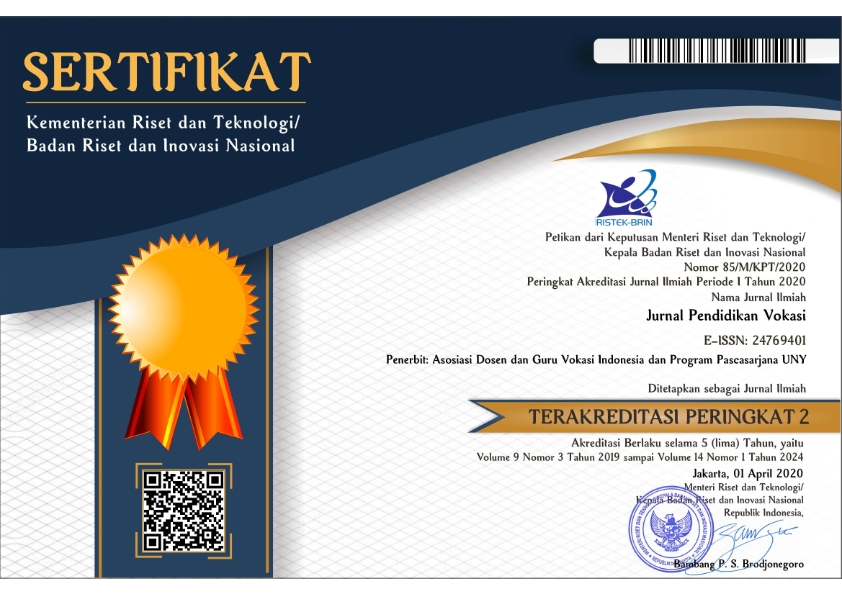The need of practical teaching in vocational high school of Automation and Office Management Program
DOI:
https://doi.org/10.21831/jpv.v9i3.26734Keywords:
practical learning needs, vocational high school, automation and office management program (AOMP)Abstract
The success of vocational education cannot be separated from the proper management of learning by its objectives. This study aims to explore the pitfalls and the needs of practical teaching in the Vocational High School of Automation and Office Management Program (AOMP) in Yogyakarta city. This research uses a descriptive method with a qualitative approach. The data obtained were analyzed by using the qualitative analysis model of Miles and Huberman with stages: data reduction, presenting data, verifying data, and concluding data. The results of this study show that the complex equations that are occurred in practical learning of the Vocational High School of AOMP are including the absence of practical teaching materials that are relevant to the industry, there is no specific time for practical learning, lack of facilities and infrastructures, deficiency tools and time to use office laboratories, and there are new types of jobs in the office workforce that are difficult to be followed. Moreover, these matters are complicated for schools to be embodied in the form of practical learning, resulting in poorly trained vocational students in doing their duty that fit the areas of expertise learned. This hardship implies that vocational students become less confident in doing their jobs in the industry either during an internship program or when working in the industry. This research is limited to pitfalls that occur in Yogyakarta City and in schools, which are the subject of this research.References
Bodner, G. M. (1986). Constructivism: A theory of knowledge. Journal of Chemical Education, 63(10), 873–878. https://doi.org/10.1021/ed063p873
Bozkurt, G. (2017). Social constructivism: Does it succeed in reconciling individual cognition with social teaching and learning practices in mathematics? Journal of Education and Practice, 8(3), 210–218. Retrieved from https://www.iiste.org/Journals/index.php/JEP/article/view/35117/36121
Clarke, L., & Winch, C. (2007). Vocational education: International approaches, developments and systems. London: Routledge.
Deist, F. D. Le, & Winterton, J. (2005). What is competence ? Human Resource Development Internatonal, 8(1), 27–46. https://doi.org/10.1080/1367886042000338227
Directorate of Vocational Development. (n.d.). Tentang BKK [About special job market]. Retrieved November 6, 2019, from https://bkk.ditpsmk.net/about
Judisseno, R. K. (2008). Jadilah pribadi yang kompeten di tempat kerja. Jakarta: PT. Gramedia Pustaka Utama.
Kusuma, H. (2019). Lulusan SMK masih dominasi pengangguran di RI. Detik Finance. Retrieved from https://finance.detik.com/berita-ekonomi-bisnis/d-4537723/lulusan-smk-masih-dominasi-pengangguran-di-ri
Lestari, I., & Siswanto, B. T. (2015). Pengaruh pengalaman prakerin, hasil belajar produktif dan dukungan sosial terhadap kesiapan kerja siswa SMK. Jurnal Pendidikan Vokasi, 5(2), 183–194. https://doi.org/10.21831/jpv.v5i2.6384
Liu, C. C., & Chen, I. J. (Crissa). (2010). Evolution of constructivism. Contemporary Issues in Education Research, 3(4), 63–66. https://doi.org/10.19030/cier.v3i4.199
Mardiyah, S. U. K., & Supriyadi, E. (2013). Evaluasi praktik kerja industri kompetensi keahlian pemasaran SMKN 1 Pengasih, Kulon Progo. Jurnal Pendidikan Vokasi, 3(3), 320–333. https://doi.org/10.21831/jpv.v3i3.1846
Miles, M. B., & Hubberman, A. M. (1994). Qualitative data anaysis. Riverside County, CA: SAGE Publications.
Murniati, A. R., & Usman, N. (2009). Implementasi manajemen strategik dalam pemberdayaan sekolah menengah kejuruan. Bandung: Citapustaka Media Perintis.
Narwoto, N., & Soeharto, S. (2013). Faktor-faktor yang berpengaruh terhadap prestasi belajar teori kejuruan. Jurnal Pendidikan Vokasi, 3(2), 222–233. https://doi.org/10.21831/jpv.v3i2.1603
Presidential Instruction No. 9 of 2016 on Revitalization program of Vocational High School (VHS) for the improvement of Indonesian human resources' quality and competitiveness (2016). Republic of Indonesia.
Regulation of the Minister of Manpower and Transmigration No. 07 of 2008 concerning manpower placement (2008). Republic of Indonesia.
Setiawati, L., & Sudira, P. (2015). Faktor-faktor yang mempengaruhi prestasi belajar teknik komputer dan informatika. Jurnal Pendidikan Vokasi, 5(3), 325–339. https://doi.org/10.21831/jpv.v5i3.6487
Sutirman, S., Muhyadi, M., & Surjono, H. D. (2017). Problems in learning of electronic filing at vocational school in Yogyakarta Special Region, Indonesia. Journal of Education and Practice, 8(5), 94–99. Retrieved from https://www.iiste.org/Journals/index.php/JEP/article/view/35470/36490
Sutrisno, V. L. P., & Siswanto, B. T. (2016). Faktor-faktor yang mempengaruhi hasil belajar siswa pada pembelajaran praktik kelistrikan otomotif SMK di Kota Yogyakarta. Jurnal Pendidikan Vokasi, 6(1), 111–120. https://doi.org/10.21831/jpv.v6i1.8118
Thomson, J. F. (1972). Foundations of vocational education: Social and philosophical concepts. Englewood Cliffs, N.J.: Prentice-Hall.
Turuk, M. C. (2008). The relevance and implications of Vygotsky's sociocultural theory in the second language classroom. Annual Review of Education, Communication, and Language Sciences (ARECLS), 5, 244–262. Retrieved from https://pdfs.semanticscholar.org/3987/5cacea3cc95ae54e504af6259ae64912adb0.pdf
Widiyanto, W. (2010). Strategi pengembangan kurikulum berbasis kompetensi DUDI untuk SMK. Jurnal Pendidikan Ekonomi Dinamika Pendidikan, V(2), 103–116. https://doi.org/10.15294/dp.v5i2.4920
Woodruffe, C. (1993). What is meant by a competency? Leadership & Organization Development Journal, 14(1), 29–36. https://doi.org/10.1108/eb053651
Yoto, Y., & Widiyanti, W. (2017). Vocational high school cooperation with P.T. Astra Honda Motor to prepare skilled labor in industries. International Journal of Environmental & Science Education, 12(3), 585–596. https://doi.org/10.12973/ijese.2017.1249p
Downloads
Published
How to Cite
Issue
Section
License
The authors submitting a manuscript to this journal agree that, if accepted for publication, copyright publishing of the submission shall be assigned to Jurnal Pendidikan Vokasi. However, even though the journal asks for a copyright transfer, the authors retain (or are granted back) significant scholarly rights.
The copyright transfer agreement form can be downloaded here: [JPV Copyright Transfer Agreement Form]
The copyright form should be signed originally and sent to the Editorial Office through email to jpvokasi@uny.ac.id
Jurnal Pendidikan Vokasi by http://journal.uny.ac.id/index.php/jpv is licensed under a Creative Commons Attribution-ShareAlike 4.0 International License.














